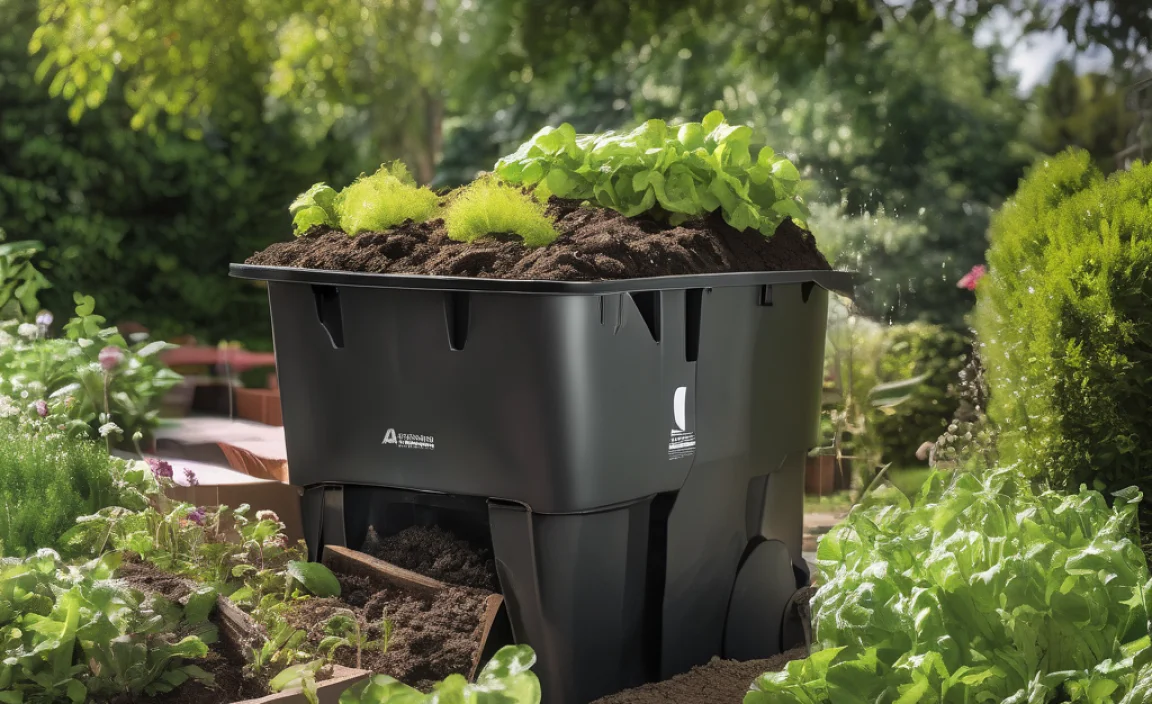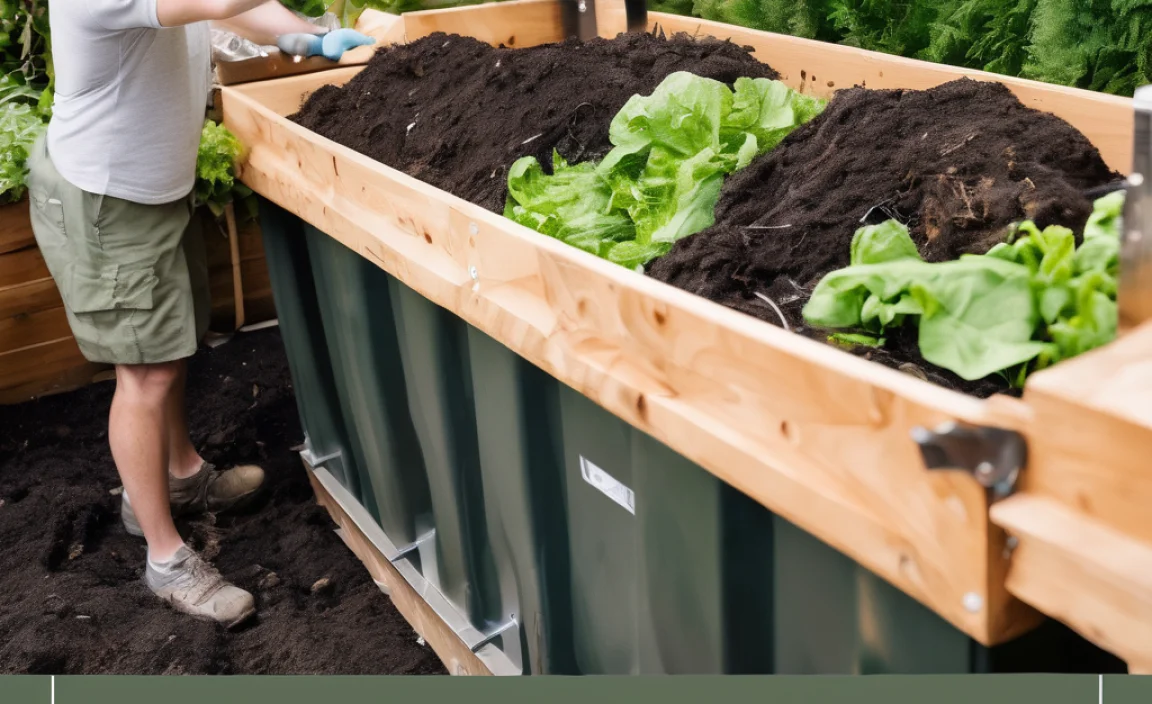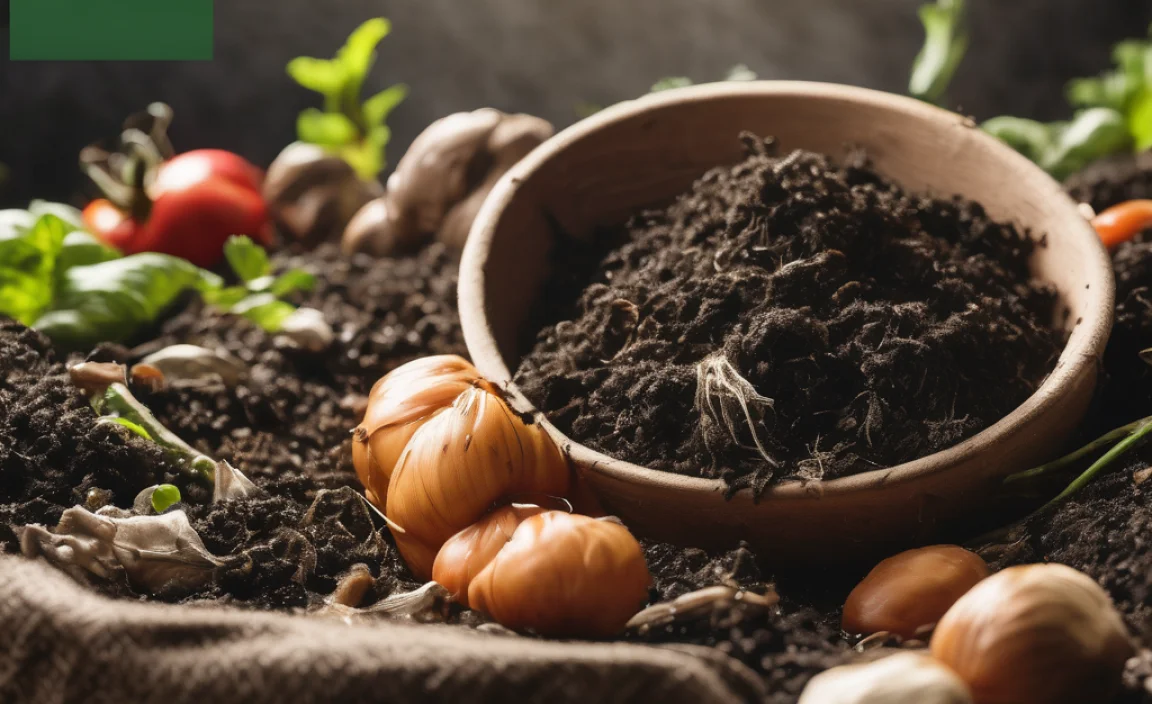Did you know not all compost makes plants happy? It might surprise you, but sometimes even the best compost can cause problems for your garden. How can something so natural go wrong? Let’s explore common compost fertilizer problems and how to avoid them. This will help your garden grow big and strong!
Key Takeaways
- Compost can sometimes harm plants if used incorrectly.
- Too much compost can lead to root problems.
- Bad smells may indicate faulty composting processes.
- Pests might be attracted to poorly made compost.
- Manage compost fertilizer problems for a healthy garden.
Understanding Compost Fertilizer Problems
Compost is a mix of decomposed organic matter. It’s like nature’s recycling system. But, if not done right, it can cause problems. Too much nitrogen can burn plants. If the compost isn’t well-decomposed, it might release harmful substances. A bad smell can mean something went wrong in the composting process. Not all materials should go into compost. For example, meat can attract pests and cause bad odors.
- Over-fertilization can harm plant roots.
- Improper composting can create harmful gases.
- Use the right balance of green and brown materials.
- Avoid putting meat and dairy in compost.
- Check moisture levels to prevent bad smells.
- Turn compost regularly for proper aeration.
It’s essential to understand these problems to keep your garden healthy. Proper composting leads to rich, black soil. This soil is full of nutrients that plants love. However, mistakes can easily happen. Always keep an eye on the composting process. Take care of your compost, and it will take care of your garden. Using the right materials and methods will ensure success.
Fun Fact or Stats : A healthy compost pile can reach temperatures of 140°F!
What Causes Compost to Smell Bad?
Have you ever noticed a bad smell coming from your compost bin? This is a sign something is not right. Compost should smell earthy, not stinky. Overly wet compost can lead to bad odors. Ensure your compost pile is not too compact and has enough air. Add dry leaves or straw if it’s too wet. Regularly turning the compost keeps it fresh. Remember, good composting equals less smell!
How Does Compost Burn Plants?
When we say compost can “burn” plants, we don’t mean fire. It refers to damage from too much nitrogen. Young plants are especially sensitive. They need a balanced diet, just like us. Excessive nitrogen from compost acts like a fertilizer overdose. It can scorch plant roots, leading to wilting or death. Always mix compost well with soil. This helps to spread the nutrients evenly.
Why Are Pests Attracted to My Compost?
It’s a sunny day, but why are there flies buzzing around your compost? Meanwhile, raccoons might be visiting at night. Pests love food scraps, especially if they’re not buried well. Avoid putting meat or dairy into your compost. They attract pests quickly. Cover fresh scraps with soil or brown materials. This keeps the smell down and pests away. A well-managed compost stays safe from critters.
Balancing Nitrogen and Carbon in Compost
Compost needs a good balance of nitrogen and carbon. This balance is crucial for decomposition. Imagine a recipe that needs the right amount of salt and sugar. Too much of one can spoil the dish. The same goes for compost. Nitrogen-rich “greens” like grass clippings and food scraps are one part. Carbon-rich “browns” like leaves and straw are the other. A good balance ensures fast decomposition and fewer problems.
- Use a mix of greens and browns.
- Monitor the temperature of your compost pile.
- Ensure proper aeration for effective decomposition.
- Keep the compost pile moist but not soggy.
- Turn compost regularly to mix materials.
By understanding the balance between nitrogen and carbon, you can make better compost. This results in a nutrient-rich mixture that’s perfect for gardens. The key is finding the right proportions. Too much nitrogen can lead to odors and pests. Meanwhile, too much carbon slows down decomposition. Always aim for a 2:1 or 3:1 ratio of browns to greens. This way, your compost will stay healthy and effective.
Fun Fact or Stats : The ideal compost temperature is between 135°F and 160°F.
How to Measure Compost Balance?
Do you know how to measure the balance in compost? It might seem tricky, but it’s simple! Use a compost thermometer to check the temperature. High temperatures mean active decomposition. If the pile cools, it might need more greens. Feel the moisture level with your hands. If it’s dry, add water. If it’s too wet, add browns. This way, you can adjust the balance as needed.
What Happens with Too Much Green Material?
Imagine building a compost pile with too many grass clippings. You might find it smelling bad. This is because too much green material leads to excess nitrogen. It causes the pile to become compact and smelly. The solution is simple: add more browns. These materials absorb excess moisture and help aerate the pile. Balance is key for successful composting!
Why Are Browns Important in Compost?
Have you ever wondered why dry leaves are important in compost? They are the browns. Browns provide carbon, which is essential for compost. They help balance the moist and rich greens. This prevents the pile from becoming slimy. Browns also create air pockets. These pockets allow oxygen to flow and aid decomposition. Without browns, your compost would become a stinky, messy pile!
Compost Fertilizer Problems: Plant Damage
Improperly used compost can damage plants. Compost is rich in nutrients. However, too much of a good thing can be harmful. If compost isn’t mixed well with soil, plant roots can be damaged. Over-fertilizing can also cause nutrient imbalances. This can lead to weak plants and poor yields. Always use compost wisely. Mix it well with the soil to ensure even distribution.
- Use compost in moderation.
- Mix compost thoroughly with garden soil.
- Check for signs of over-fertilizing.
- Water plants regularly to balance nutrients.
- Observe plant growth for any issues.
It’s important to be aware of how compost affects plants. By observing plant health, you can adjust compost use as needed. Healthy plants have vibrant leaves and strong growth. If plants start wilting or yellowing, it’s time to check compost use. Finding the right balance will help your garden thrive.
Fun Fact or Stats : Compost improves soil structure, making it ideal for plant roots.
How Does Compost Affect Soil pH?
Did you know compost can affect soil pH? This is how acidic or alkaline the soil is. Most plants like slightly acidic to neutral soil. Compost can make soil more alkaline. If too much is used, it might harm acid-loving plants. To find the right balance, test soil pH regularly. Adjust compost use to keep soil pH suitable for your plants.
What Happens with Over-Fertilization?
Have you ever added too much compost to plants? It seems harmless, but it can be dangerous. Over-fertilization causes an excess of nutrients. This can burn plant roots. Leaves might turn brown, and growth can slow down. To avoid this, add compost gradually. Watch how plants respond. A little goes a long way in keeping plants healthy!
Why Is Mixing Compost Important?
Imagine adding compost on top of the soil and leaving it. Would it work? Not really! Mixing compost with soil is crucial. It helps spread nutrients evenly. This prevents plant roots from getting overwhelmed. It also ensures compost is properly incorporated. Mixing also balances soil texture, making it easier for plants to grow. Never skip this important step!
Dealing with Compost Pests
Compost can sometimes attract unwanted visitors. Flies, rodents, and other pests might find your compost pile appealing. This is often due to improper composting practices. Food scraps not buried well can emit odors that attract pests. Avoid putting meat and dairy into compost. These can attract pests quickly. Cover new scraps with soil or brown materials to reduce smells. Regularly check your compost to keep pests away.
- Cover food scraps with soil.
- Avoid adding meat and dairy.
- Turn compost regularly to prevent smells.
- Keep the compost bin closed.
- Check for any signs of pests.
Keeping pests out of your compost is important for a healthy garden. By managing your compost correctly, you can prevent pest problems. Always monitor your compost pile for any signs of pests. Using the right materials and techniques helps keep it pest-free. A well-maintained compost leads to a thriving garden.
Fun Fact or Stats : A good compost pile is too hot for many pests to survive in!
What Pests Commonly Visit Compost?
Have you ever wondered why pests visit compost? Common visitors include flies, rodents, and raccoons. They are drawn to the smell of food scraps. If the compost isn’t managed well, it becomes a buffet for these creatures. To prevent this, keep the compost covered and buried. Proper composting will keep pests at bay and your garden safe.
How to Prevent Flies in Compost?
Do you notice flies buzzing around your compost? They are usually attracted to exposed food scraps. To prevent them, cover scraps with soil or browns. This reduces smells and keeps flies away. Keeping your compost bin closed also helps. Regularly turning the compost ensures it stays aerobic and less attractive to flies.
Why Is a Closed Compost Bin Useful?
Have you seen compost bins with lids? They serve an important purpose. A closed bin keeps pests out and moisture in. It also controls odors. This helps maintain a clean composting environment. Closed bins are especially useful in urban areas. They prevent animals from getting in and spreading compost around.
Compost Troubleshooting: Common Issues
Composting isn’t always smooth sailing. Sometimes, things go wrong. Maybe your compost pile isn’t breaking down quickly. Or it has a bad smell. These are common problems that many face. Understanding their causes helps you fix them. For example, a lack of air causes slow decomposition. Too much moisture leads to bad smells. Knowing how to troubleshoot saves your compost.
- Check moisture levels regularly.
- Aerate the compost often.
- Balance greens and browns.
- Keep the compost pile warm.
- Adjust materials as needed.
Troubleshooting common compost issues ensures success. Always monitor your pile for any signs of trouble. Make adjustments as needed to maintain a healthy compost. Remember, composting takes time and patience. With practice and care, you can overcome any problem. A well-managed compost leads to a thriving garden full of life.
Fun Fact or Stats : A well-maintained compost pile can reduce waste by 30%!
Why Is My Compost Not Breaking Down?
Is your compost pile sitting there without change? It might be lacking air. Compost needs oxygen to break down materials. Without it, decomposition slows. Regularly turning the pile adds air. This keeps the process going. Another reason might be cold weather. Compost needs warmth to decompose. Keep the pile insulated for better breakdown.
How to Fix a Smelly Compost Pile?
Do you have a stinky compost pile? It can be fixed! The smell often comes from too much moisture or lack of air. Start by adding more browns. These absorb moisture and improve aeration. Turn the pile to add air and reduce smells. If needed, cover the pile to protect it from rain. Proper management keeps your compost fresh.
Why Is Aeration Important in Composting?
Have you ever thought about why compost needs air? Aeration is crucial for decomposition. Oxygen helps break down materials quickly. Without it, the process slows, and bad smells form. Regularly turning the compost keeps it aerated. This ensures even decomposition and a healthy pile. Never skip this important step in composting!
Conclusion
In conclusion, compost fertilizer problems can happen if not done correctly. Understanding these issues helps you create better compost. Always balance materials, manage odor, and prevent pests. By following these tips, your garden will thrive with healthy compost. Remember, good composting practices lead to a fruitful garden.
FAQs
Question: What are common compost fertilizer problems?
Answer: Common problems include bad odors, pest attraction, and plant damage. These issues often arise from improper composting techniques. By balancing materials and maintaining the right conditions, you can prevent these problems and create effective compost.
Question: How can I prevent compost from smelling bad?
Answer: Preventing bad smells starts with managing moisture. Ensure the compost isn’t too wet. Add more browns like dry leaves to absorb moisture. Regularly turn the compost to aerate it. This helps reduce odors and keeps the compost fresh.
Question: Why are pests attracted to my compost?
Answer: Pests are attracted to exposed food scraps. They smell the food and come to investigate. To avoid this, bury scraps under soil or browns. Avoid adding meat or dairy, which are especially attractive to pests.
Question: How does over-fertilization affect plants?
Answer: Over-fertilization can burn plant roots and damage them. This happens from excess nitrogen in the compost. Plants may wilt or show discolored leaves. Always use compost in moderation and mix it well with soil.
Question: What is the ideal compost balance?
Answer: A good compost balance includes the right mix of greens and browns. Greens provide nitrogen, while browns provide carbon. Aim for a 2:1 or 3:1 ratio of browns to greens. This ensures effective decomposition and nutrient-rich compost.
Question: How do I fix a slow decomposing compost?
Answer: Slow decomposition can be fixed by adding air. Turn the compost regularly to improve aeration. Check moisture levels to ensure it’s not too wet. If the weather is cold, insulate the pile to keep it warm.



